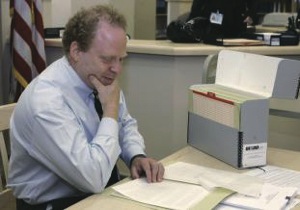-
- Records reveal Nixon aimed to show ‘nice’ side
- Inmate performs self-castration and sues for estrogen therapy
- ‘Hustler’ magazine’s publisher investigating sexual activities of lawmakers
- Surgeon general nominee says he would resign rather than let politics dictate science
- Chicago’s 2006 Gay Games declared a financial success
- Co-chair of John McCain’s presidential campaign arrested in gay sex sting
- National News Briefs
national
Records reveal Nixon aimed to show ‘nice’ side
Tried to taint Dems by tying to gay liberation
Published Thursday, 19-Jul-2007 in issue 1021
WASHINGTON – President Nixon and his 1972 re-election campaign tried to tie Democrats to the mob, gay liberation and even slavery, according to newly released papers and tapes betraying bare-knuckle tactics from the dawn of the Watergate scandal.
Still, even as Nixon’s lieutenants explored every avenue for defeating Democrat George McGovern and nullifying critics of all stripes – “hit them” was a favorite phrase – the president brooded over his reputation as a hard man whose gentle side was not being seen by the public.
Nixon called that side of him “the whole warmth business.”
In 1970, he wrote an 11-page, single-spaced memo detailing his acts of kindness to staff and strangers and expressing regret that he was getting no credit for being “nicey-nice.”
In the profanity-laced conversation for which he was known in private, Nixon complained bitterly about Democratic campaign hecklers who shouted down his speeches, in contrast to well-mannered Republicans.
Officials released 78,000 documents and more than 11 hours of taped conversations from Nixon’s presidency as part of a transfer of control of the Richard M. Nixon Library and Birthplace from private interests to the federal government on Wednesday.
The new material shows a keen interest in tainting the Democratic ticket of George McGovern and running mate Sargent Shriver by any means possible in the months leading up to Nixon’s landslide re-election and then to the Watergate revelations that consumed Nixon’s presidency in 1974.
The idea was to “move the negative on McGovern,” as aide Pat Buchanan put it.
McGovern, who will be 85 this month, told the Associated Press on Wednesday that the tactics were “another example of how the Nixon administration drifted away from both common sense and decency.” And he noted that Nixon seemed to take little satisfaction in the outcome.
“I think it’s rather sad that at the moment of Nixon’s greatest triumph, his victory over me in ‘72, he seemed to be angry and resentful and peevish,” he said. “One would have thought that he would have been filled with joy and jubilation, but apparently that isn’t the case.”
In one tactic, in an Aug. 1972 memo, an aide reports to chief of staff H.R. Haldeman on setting up an “apparatus” to comb through lists of McGovern’s staff and contributors for “left-wing mob connections.”
That was two months after the break-in at Democratic headquarters at the Watergate complex by burglars tied to Nixon’s re-election committee, and before the cover-up was fully exposed.
Another memo recommended looking for TV footage of an apparent Democratic debate over a “Gay Lib” plank in that party’s platform. Nixon aides salivated over the prospect of showing that to Middle America: “It would make excellent footage in a union hall during the campaign,” wrote political aide Gordon Strachan.
Nixon aides worked assiduously to plant negative stories, including one alleging Shriver’s ancestors were slaveholders.
An operative “is trying to get the story fed into certain segments of black media and will give it to black surrogates,” an aide told Chuck Colson, Nixon’s chief counsel.
Nixon aide Daniel Patrick Moynihan, later a Democratic senator, blasted White House and campaign colleagues for putting “intolerable” falsehoods in the president’s mouth.
“This demeans the presidency and will mar his victory,” Moynihan said of errors that “riddled” Nixon speeches. “You should hit those speechwriters hard,” he told Haldeman.
Nixon’s insecurities only seemed deepened by the election results, despite winning every state except Massachusetts. He was obsessed with outperforming Lyndon Baines Johnson, upset with the congressional results and eager to deflect the blame. The GOP lost two Senate seats and gained only 12 in the House.
“The people that I saw we were running in some of the northern and western states – God, they seemed like a bunch of sad sacks,” he said in a phone call to Harry S. Dent, an architect of Nixon’s earlier Southern strategy, the day after the election.
|
|
Copyright © 2003-2025 Uptown Publications


